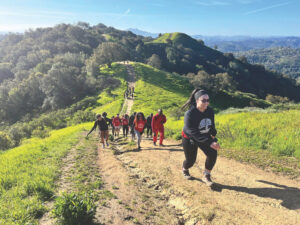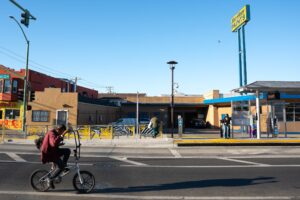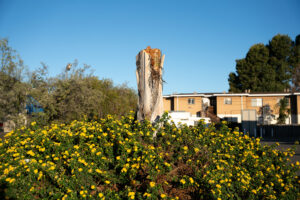
Walking into Planting Justice’s East Oakland nursery feels like walking into an urban oasis.
Its grounds, in the Sobrante Park neighborhood, are a patchwork of multicolored plants. Rows of fruit trees—apples, figs, Asian pears, European pears, Japanese plums, pomegranates, jujube, quince, loquat and more—fill the space. It’s hard to even walk in a straight line. From this 2-acre lot, Planting Justice sells more than 1,100 varieties of plants—many of them hard to find, and suitable for a range of climate zones—and ships them across the continental United States. Sometimes demand has even outstripped the nursery’s capacity. But beyond the booming plant business, Planting Justice uses its nursery as a tool for social change—to end the cycle of incarceration.
“Nobody’s got our kind of re-entry program that mixes soil, reentry, healing, and good pay,” says operations director Lynn Vidal. The nonprofit, founded in 2009, has employed more than 40 people transitioning from prison so far, many at the nursery. So far, the organization has seen a 2 percent recidivism rate, compared to 50 percent statewide, according to Vidal.
Visit
Planting Justice
319 105th Ave
Oakland, CA 94603
Planting Justice offers more than 1,100 varieties of trees, all organic, and ships across the continental United States. Visit its Sobrante Park Nursery on weekdays 8:30am–4pm, and on Saturday, 10am–4pm
Watch this video to learn more about the organization.




Clockwise from top left: Planting Justice’s Sobrante Park nursery; the flags adorning its grounds; Sol Mercado tends plants. (Courtesy of Sol Mercado)
Near the entrance hang cyanotype flags, some made with orange prison jumpsuits—all printed with messages like “build gardens, not prisons” and “hawthorne, not handcuffs.” A greenhouse peeks out from the corner, and a gray cat prowls between garden beds. Staff members graft, plant, tend, and harvest, and the nursery thrums with energy and action. Most of the plant cuttings are sourced at Planting Justice’s 4-acre “mother” farm in El Sobrante; then they come here to mature and be shipped out to their new lives.
Sol Mercado, the re-entry coordinator, says the organization meets the needs of formerly incarcerated people during “a very critical time” of transition. She experienced it firsthand. Mercado first encountered Planting Justice through a prison gardening program. “I was weeding, and I was pruning and watering,” Mercado says, “and I was able to have that time to really think and process what led to me committing my crime, and how do I want to heal—and how I never want to be the same person again when I get out of here.”
Mercado was released three years ago at age 35, after 16 years in prison, and started working at Planting Justice almost immediately. “Being here, working, and feeling the stability, has helped me a lot to get my life in order,” Mercado says; Planting Justice has “given me the opportunity to be the person that I wanted to be.”


From left: Yennifer Copto and Adela Flores transplant trees; Simone Robinson is among the staff members who tend, transplant, and ship more than 1,100 varieties of plants. (Courtesy of Planting Justice)
In addition to the nursery business, Planting Justice teaches gardening and food sovereignty to young people, and distributes fresh produce and free trees to local communities. It has also helped local neighborhoods set up more than 450 community gardens, and formerly worked on a prison gardening program. It’s also building an East Oakland aquaponics incubation farm and a pay-what-you-can cafe.
For many staff members, this work is personal. “I grew up here, I’ve been here forever, I’m fourth or fifth generation right here,” says Covonne Page, aquaponics incubation farm manager. His hopes for the organization: “For this place to run on its own and be able to continue to employ people from this community and give them a wage where they can actually live and not have to struggle.”
Highway 880 sits just south of the nursery, and the din of cars and the occasional helicopter is a constant. “A lot of crime happens back there, gunshots—it affects us a lot,” says Page. The solution, Mercado and others on staff say, is finding “permanent fixes” for resourcing the Sobrante Park community.
Planting Justice offers one path forward. The organization brings resources and agency to those in the community, says Vidal, and it’s a model that many on staff hope can be replicated in other areas. “Planting Justice is the future, in my estimation,” says Vidal, and “it starts one community at a time.”




